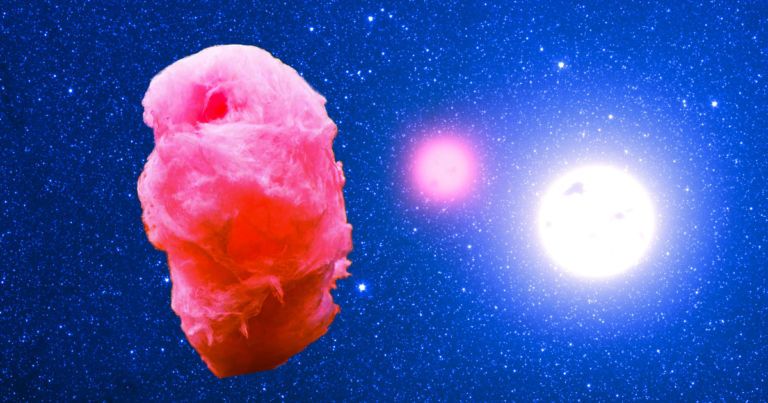‘Super-Puff’ Exoplanets With Density of Cotton Candy Discovered
Listen to “E210 ‘Super-Puff’ Exoplanets With Density of Cotton Candy Discovered” on Spreaker.
Article by Chris Ciaccia December 20, 2019 (foxnews.com)
• A research study by astronomers (at the University of Colorado Boulder), utilizing data from the Hubble Space Telescope, have discovered three exoplanets in the Kepler 51 star system that are nearly the size of Jupiter but have extremely low densities – less than 100 times Jupiter’s mass. The study’s lead author, Jessica Libby-Roberts, stated that these “super-puff” exoplanets with the density of cotton candy are “very bizarre”.
• The Kepler 51 system is approximately 2,400 light-years from Earth and is approximately 500 million years old. A light-year equals 6 trillion miles.
• Studying the planets’ atmospheres, “We expected to find water,” said Libby-Roberts, “… but we couldn’t observe the signatures of any molecule.” In fact, the atmospheres were opaque rather than transparent. Libby-Roberts believes that the planets’ hydrogen and helium atmospheres are covered by a “thick haze… of methane” similar to Saturn’s moon, Titan.
• The research team also discovered that the exoplanets are losing gas rapidly, with the innermost of the three exoplanets putting an estimated “tens of billions of tons of material into space every second.” Should that trend continue, these planets could shrink considerably over the next billion years and might wind up looking similar to “mini-Neptunes”.
• One of the study’s co-authors, Zachory Berta-Thompson, said, “[W]e’re seeing them at a time in their development where we’ve rarely gotten the chance to observe planets.” “They give us an opportunity to study worlds that are very different than ours, but they also place the planets in our own solar system into a larger context.”
Astronomers have discovered a number of “super-puff” exoplanets in the Kepler 51 star system that are as dense as cotton candy.

Utilizing data from the Hubble Space Telescope, researchers found fewer than 15 of the planets that

are almost as big as Jupiter, but have extremely low density, at less than 100 times the gas giant’s mass or less than 0.1 grams per cubic centimeter of volume.
“They’re very bizarre,” said the study’s lead author, Jessica Libby-Roberts, in a statement.
“This is an extreme example of what’s so cool about exoplanets in general,” said Zachory Berta-Thompson, one of the study’s co-authors, said. “They give us an opportunity to study worlds that are very different than ours, but they also place the planets in our own solar system into a larger context.”
The three “super-puff” exoplanets in the Kepler 51 system were “straight-up contrary to what we teach in undergraduate classrooms,” Berta-Thompson added.
The Kepler 51 system is approximately 2,400 light-years from Earth and is approximately 500 million years old. A light-year, which measures distance in space, equals 6 trillion miles.
FAIR USE NOTICE: This page contains copyrighted material the use of which has not been specifically authorized by the copyright owner. ExoNews.org distributes this material for the purpose of news reporting, educational research, comment and criticism, constituting Fair Use under 17 U.S.C § 107. Please contact the Editor at ExoNews with any copyright issue.
